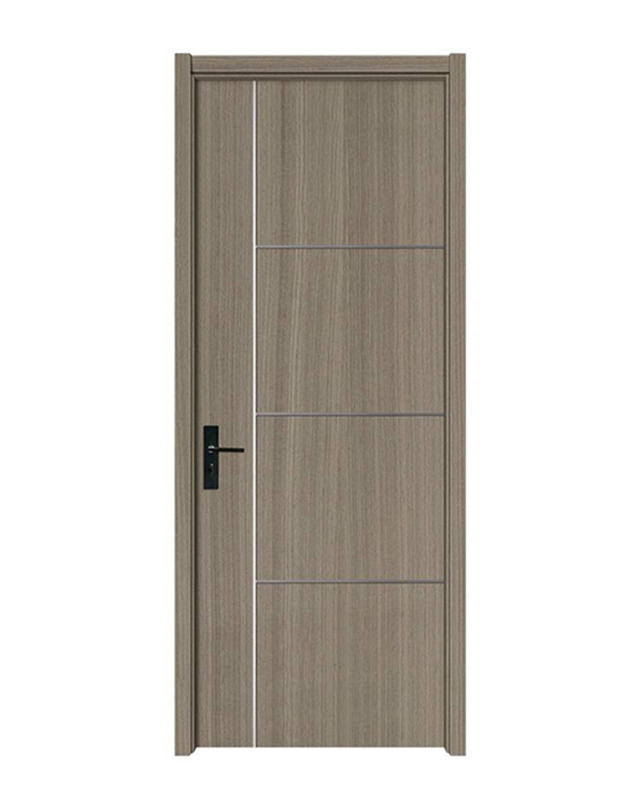In modern home decoration, whether indoors or outdoors, choosing the right door is crucial to the design, durability and comfort of the space. A trusted PVC Door Factory can not only provide a production center, but also provide integrated solutions based on design and quality for residential and commercial projects. From raw materials to fully functional doors, every step is carefully and efficiently managed to meet diverse market needs.
Various aspects that define a well-organized PVC door factory operation - from materials and technology to design diversity and customer-centric strengths - are here.

1. What a PVC Door Factory Produces
A PVC Door Factory typically manufactures a wide range of products using polyvinyl chloride as the base material. These include:
Interior PVC doors
Bathroom doors with waterproof cores
Decorative laminated PVC panels
Customized size and design solutions
Sound-insulated PVC sliding doors
What sets PVC doors apart is their resistance to moisture, warping, and corrosion, making them particularly ideal for kitchens, bathrooms, and high-humidity environments.
2. Materials That Define Quality
The foundation of door quality begins with raw materials. A well-run PVC Door Factory selects top-tier inputs that include:
| Material | Purpose | Advantages |
|---|---|---|
| PVC Resin | Main structural polymer | Water-resistant, durable, recyclable |
| Calcium Carbonate | Reinforcement and filler | Cost-efficient, improves rigidity |
| UV Stabilizers | Protects against discoloration | Long-term appearance retention |
| Wooden Core Options | For composite or hybrid door construction | Added strength, better insulation |
Each material plays a key role in ensuring that the final product balances aesthetics, utility, and sustainability.
3. The Production Process in a PVC Door Factory
The transformation from raw material to a finished PVC door involves several coordinated steps:
-
● Mixing & Extrusion – Raw PVC is blended with additives, then extruded into panel shapes.
-
● Cooling & Shaping – Panels are cooled and shaped based on design specifications.
-
● Surface Treatment – Textures and laminates are added through hot stamping or vacuum press.
-
● Cutting & Assembly – Panels are trimmed and assembled with frames, locks, and accessories.
-
● Quality Check & Packaging – Every piece undergoes strict QC before being packed for delivery.
4. Customization and Design Flexibility
One of the key strengths of a modern PVC Door Factory lies in its remarkable ability to deliver tailored design solutions. In today’s construction and interior design markets, flexibility is no longer a luxury—it’s an expectation. As such, many factories are equipped to provide a wide range of customization options, ensuring that every door not only meets technical specifications but also aligns with aesthetic preferences.
Customers can personalize their PVC doors in numerous ways. The commons include:
Color and Finish: From classic white to bold contemporary shades, the factory can accommodate requests for matte, woodgrain, or high-gloss finishes. These choices help homeowners or designers match the doors with various room styles, wall colors, or existing furniture.
Panel Thickness and Height: Whether it’s for added durability or a specific architectural requirement, clients can select the thickness and height of each door panel. Thicker panels can offer better sound insulation and sturdier feel, while custom heights may suit unconventional spaces or luxury design preferences.
Handle Type and Lock Style: From traditional handles to minimalist flush options, and from basic locks to multi-point security systems, hardware choices play a big role in both design and function. A good PVC Door Factory will offer a range of these fittings to complement each door design.
Sliding or Swinging Door Mechanisms: Depending on spatial constraints and room layout, clients may prefer sliding doors for compact spaces or swinging doors for standard entrances. Factories often provide both configurations, with installation-ready systems.
In addition to custom orders, this level of customization meets the needs of contractors, architects and interior designers for doors that can fit seamlessly into larger projects. It also enhances the factory’s ability to meet the needs of international markets, where design trends and functional expectations vary widely.

5. Technical Specifications and Performance Metrics
When choosing PVC doors, technical specifications matter, especially for professionals in the construction and renovation industry.
| Specification | Standard Value | Application Notes |
|---|---|---|
| Panel Thickness | 25mm–45mm | Varies based on strength requirement |
| Water Absorption Rate | <0.3% | Excellent for humid environments |
| Fire Resistance Rating | Class B1 or B2 | Complies with interior safety norms |
| Density | ~1.4 g/cm³ | High enough for impact resistance |
| UV Resistance Duration | 3–5 years (uncoated) | Extendable with protective coating |
These metrics help assure buyers of the performance longevity and environmental compatibility of PVC doors.
6. Advantages of Working With an Established PVC Door Factory
Why choose a dedicated factory over a general supplier? The benefits are clear:
-
● In-house production ensures consistent quality control
-
● Custom mold and tooling capabilities
-
● Shorter lead times and efficient logistics
-
● Post-sale support for large-scale projects
7. Sustainability in PVC Door Manufacturing
Modern consumers and developers increasingly prioritize sustainability. Many PVC Door Factories now invest in:
● Recyclable PVC material cycles
● Low-VOC adhesives and laminates
● Solar-powered machinery
● Wastewater treatment systems
These green initiatives align with global expectations for more environmentally friendly building materials.
8. Applications Across Different Environments
PVC doors are highly adaptable and can be used in a wide range of environments beyond typical home settings. In the healthcare sector, such as hospitals and clinics, their smooth surfaces make them easy to sanitize, supporting hygiene standards. Educational institutions, including schools and universities, often choose PVC doors for their safety features and ability to withstand heavy daily use.
-
In commercial spaces like public restrooms, their resistance to moisture helps maintain structural integrity over time. Additionally, in high-humidity environments such as kitchens and laundry rooms, PVC doors perform well against heat and condensation, making them both functional and long-lasting. Their versatile nature has allowed them to become a popular solution for architects and builders seeking dependable performance in various scenarios.
9. Design Trends Seen in a PVC Door Factory
From customer orders and market feedback, current style trends include:
5 Popular PVC Door Trends
1.Woodgrain finishes that mimic oak, walnut, or ash
2.Flat-panel minimalist designs
3.Hidden handles with magnetic locks
4.Bi-color doors for interior contrast
5.Vertical ribbed textures for a 3D effect
Factories stay ahead of the curve by investing in design forecasting and quick production adaptation.
10. How to Choose the Right PVC Door Factory
When sourcing doors for a project, evaluate the factory’s capabilities based on:
● Experience and certification
● Range of available models
● Customization capacity
● Export and logistics support
● Sample request policy
Establishing direct cooperation with a trusted PVC Door Factory not only streamlines procurement but also builds long-term supply assurance.
-
A professional PVC Door Factory acts as both a production hub and an innovation partner in today’s building materials industry. By combining durable materials, refined aesthetics, and efficient manufacturing, these factories help make quality doors more accessible for everyone.
If you're exploring new suppliers or upgrading your current design options, a dependable PVC Door Factory like Haibodoor can deliver both product value and professional service across every step of the process.

 English
English русский
русский Français
Français Español
Español bahasa Indonesia
bahasa Indonesia عربى
عربى



